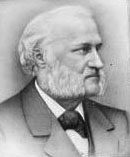Julian Sidney Rumsey
This article includes a list of general references, but it lacks sufficient corresponding inline citations. (March 2024) |
Julian Rumsey | |
|---|---|
 | |
| 22nd Mayor of Chicago | |
| In office May 6, 1861 – May 5, 1862 | |
| Preceded by | John Wentworth |
| Succeeded by | Francis C. Sherman |
| Personal details | |
| Born | April 3, 1823 Batavia, New York |
| Died | April 20, 1886 (aged 63) Chicago, Illinois, United States |
| Political party | Republican |
| Residence(s) | Chicago, Illinois |
Julian Sidney Rumsey (April 3, 1823 in Batavia, New York – April 20, 1886 in Chicago, Illinois) served as mayor of Chicago, Illinois (1861–1862) for the Republican Party.
Early life
[edit]Rumsey was born on April 3, 1823[1] in Batavia, New York.[2]
Early career
[edit]Rumsey arrived in Chicago on July 28, 1835, to work in a shipping company owned by his uncles.[3] He and his brother subsequently became partners. This firm, then known as Newberry and Dole, sent out the first shipment of grain from Chicago in September 1839. In 1852 Dole retired, and the firm, which was for a time known as Rumsey Brothers, devoted itself exclusively to the grain commission business.
Rumsey was identified with the history of Chicago for more than half a century. During that period he was mayor, county treasurer, and president of the Chicago Board of Trade. He was a charter member of the Board of Trade, and through his efforts the present system of grain inspection and grading was adopted. This achievement gave him the title of the "Father of Grain Inspection."[citation needed] His efforts to implement strict inspection standards helped to give Chicago a strong reputation among American grain markets.[3]
Rumsey always took an interest in national and state politics.
Mayoralty
[edit]In 1861, Rumsey was elected mayor of Chicago, defeating Democratic nominee Thomas Barbour Bryan. Running for mayor during a period that preceded the Civil War, he did much to arouse the enthusiasm of his fellow citizens in favor of the preservation of the Union, and at the mass meeting in Metropolitan Hall a few days after the firing on Fort Sumter, he delivered a stirring address.
Rumsey was sworn in as mayor on May 6, 1861.[4]
Rumsey required all Chicagoans to take an oath of loyalty.[3]
Rumsey's mayoralty ended on May 5, 1862, when he was succeeded in office by Democrat Francis Cornwall Sherman, who had won election in that year's election.[5]
Post-mayoralty
[edit]Rumsey was a member of the first war finance committee, and of the Republican state committee the same year. During the Panic of 1873 he was president of the Corn Exchange National Bank.
In 1869, he founded the Illinois Society for the Prevention of Cruelty to Animals.[3]
Death
[edit]Rumsey died on April 20, 1886 of "progressive paresis" that occurred after a short period of illness.[2] He is buried in Graceland Cemetery.[6]
Memorials
[edit]Rumsey Avenue, which runs NE/SW between the intersections of 87th St. & Pulaski and 85th St. & Hamlin, on Chicago's far Southwest Side, is named for him.
References
[edit]- ^ "Mayor Julian Sidney Rumsey Biography". www.chipublib.org. Chicago Public Library. Retrieved 11 November 2024.
- ^ a b "Ex-Mayor Rumsey Dead". New York Times. April 21, 1886. Retrieved 11 November 2024.
- ^ a b c d "The History of Chicago's Mayors - presented by Illinois Genealogy Trails". Genealogytrails.com. Retrieved 11 November 2024.
- ^ "Mayor Julian Sidney Rumsey Inaugural Address, 1861". www.chipublib.org. Chicago Public Library. Retrieved 26 May 2020.
- ^ "Mayor Francis Cornwall Sherman Inaugural Address, 1862". www.chipublib.org. Chicago Public Library. Retrieved 26 May 2020.
- ^ "Graceland Cemetery: Mayor Julian S. Rumsey". Graveyards.com. Retrieved 11 November 2024.
- Wilson, J. G.; Fiske, J., eds. (1900). . Appletons' Cyclopædia of American Biography. New York: D. Appleton.
External links
[edit]
